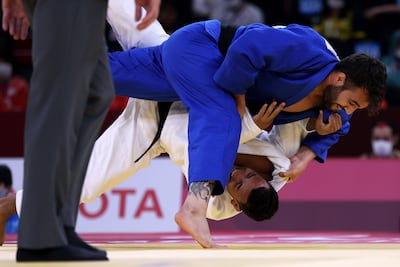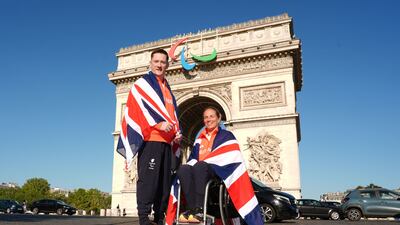As a teenager, I represented Northern Ireland at judo. Owing to my mediocre talent, my international career was brief and unremarkable. However, competing outside the relatively small world of Irish judo, I met many different fighters and learnt a few things along the way. One of these lessons sprang into my mind this week, prompted by the Paralympic Games that start on Wednesday in Paris.
At one tournament in England, the usual routine of walking on to the mat, bowing and waiting for the referee’s signal to begin was disrupted. My opponent, instead of walking on alone, was being guided by a helper to his starting position. He was visually impaired, and had a lot of home support. The only concession he received from officials was that we were allowed to take our grips before the command to begin.
It was clear quite quickly who the better fighter was. He was strong, aggressive and had good technique; after some frantic grappling, I found myself thrown to the ground and pinned. Game over. In hindsight, I shouldn’t have been so surprised or disappointed by my defeat. Judo is a tactile combat sport; the pulling and pushing allow fighters to feel which way their opponent is moving and to react accordingly. My rival’s blindness was no barrier to this.
A banal lesson to draw here would be: never underestimate an opponent. The true lesson, however, is this: disabled athletes are sportsmen and women whose will to win is no less than that of able-bodied competitors. Sadly, it’s a lesson that has taken the world some time to learn.
As nearly 4,500 athletes from 180 National Paralympic Committees – including a Refugee Paralympic Team – assemble in Paris, Paralympic sports will be beamed into homes around the world. Although times have changed since Rome hosted the first Paralympic Games in 1960, and the event’s profile is higher than ever, too many antiquated attitudes towards disabled sports live on.
Research commissioned this year by British broadcaster Channel 4 revealed that nearly 60 per cent of respondents said they watch the Paralympic Games to “see athletes overcoming their disabilities”. Less than half – 37 per cent – said they watch the games for “exciting sporting competition”. Too often, disabled athletes are described as being “inspirational”, with an overt focus on their “story” rather than their sporting prowess or career.
It is true that such athletes can indeed be an inspiration to other disabled people. But as four-time Paralympic medallist Don Elgin told Australian broadcaster ABC at the time of the 2016 Rio Paralympic Games, repeatedly focusing on athletes’ “courage” is “condescending because we’re too quick to put a tag on the fact that someone hasn’t got that ultimate make-up, two arms and two legs. The athletes that I’m aware of, which is a lot of athletes, they’re over that”.
Ignorance and misunderstanding have dogged disabled sports for years. In 2005, Murderball, a documentary about the tough world of wheelchair basketball, featured one player recalling with exasperation how he’d once been wished good luck for the Special Olympics, the international tournament for athletes with intellectual and developmental disabilities.
In addition, research commissioned in 2011 by Scope, a British disability charity, found that nearly one in four disabled respondents found the Paralympics patronising. Two years later, a survey led by a former Paralympic gold medallist published in Disability and Society found its participants were “particularly cynical of the portrayal and production of the games and its Paralympic athletes as they perceived that the wider population of disabled people is misrepresented”.

It is perhaps telling that in 2024, the International Paralympic Committee still feels the need to publish a guide for journalists reporting on para athletes. Among the guidance is advice to avoid “emotional wording” such as “tragic”, “afflicted” or “victim”, and to not portray para athletes as “extraordinary” or “inspirational”. This, the IPC says, overstates the achievements of para athletes, inadvertently suggesting that the original expectations were not high.
Credit where it’s due, however – these Paralympics are receiving some smarter and more effective promotion. In May, the IPC released a video ad that began with a saccharine animation of para athletes and cartoon animals that is broken with a kick from a female para taekwondo fighter. Its caption reads: “They’re not playing games.” The aforementioned Channel 4 has produced its own no-nonsense Paralympic ad, a gritty affair that depicts Paralympians taking on and overcoming forces such as gravity, friction and time.
This suggests that society is moving closer towards appreciating disabled sports for what they are – sports. Paralympians often compete with an athleticism, skill level and discipline that would match many able-bodied athletes and certainly surpass the meagre abilities of armchair pundits. That many train and compete with limited funding – or self-finance entirely – serves only to highlight their commitment.
That commitment will be on show over the next 11 days, and more viewers are taking notice. The IPC says Rio 2016 reached a cumulative TV audience of 4.1 billion people in more than 150 countries; there’s no reason to think that the Paris games won’t have a similar, or even greater, impact. The fact that many athletes are documenting their journey on social media also means they can present their own narrative, rather than relying exclusively on traditional media coverage.
It’s an exciting moment, and a tonic for those of us still pining for the action offered by the Olympics earlier this summer. For my part, I’ll be following Maryam Al Dhanhani, the first Emirati woman to represent the UAE in judo at the Paralympics. Like the thousands of other athletes in the French capital, she’s not there to participate, she’s there to win. That’s a lesson we should all appreciate.


